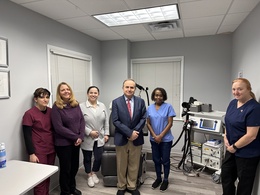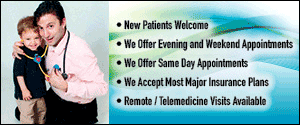
The field of mental health, just like every other facet of modern medicine, is in a state of constant evolution. As new research and studies yield the new treatments heralding new hope for longtime patients, there always seems to be something novel and promising in mental-health experts’ toolkits to help those with depression that has stubbornly evaded effective solutions.
Depression Doctors, a five-location practice established by two board-certified psychiatrists, sees patients whose treatments address a range of psychiatric illnesses. And treating a constellation of diagnoses—especially the treatment-resistant depression that can leave patients feeling resigned to a lifetime of shouldering the onerous symptoms of their conditions—means staying on the cutting edge of the breakthrough treatments proven to restore the quality of life that longtime sufferers have been denied.
“As medicine advances so fast, you need to change with the new, more current information,” says Dr. Alican Dalkilic, or “Dr. Dal,” a board-certified psychiatrist at Depression Doctors. “We’re always looking for that advanced, new treatment or innovation because patients are coming in and asking us, ‘Can I try this? Is there something else that will work for me?’”
Two of the specialized, thoroughly modern treatments offered at Depression Doctors that set the clinic apart are Transcranial Magnetic Stimulation, often referred to as TMS, and Spravato, the nasal-spray form of Esketamine that’s been available since 2018 and is closely related to ketamine, a medication proven to rapidly alleviate depression cases that have eluded other forms of treatment.
Both, as Dr. Dal points out, are FDA-approved therapies covered by Medicare and most commercial insurance, and have demonstrated their significant capacity for helping patients who thought they’d exhausted all their current options in battling “treatment-resistant depression, major depressive disorder, which has not responded to two to four antidepressants and therapy trials.”
While only a medical professional can determine if TMS or Spravato is right for treating an individual’s depression—timing, dosage or administration, frequency of sessions and individual medical histories are just some of the elements that need to be monitored, adjusted or considered according to a doctor’s assessment—it is important to understand the differences between the two.
What to know about TMS
A non-invasive, non-pharmaceutical approach, approved by FDA for treatment resistant major depressive disorder and anxious depression, obsessive compulsive disorder (OCD), smoking cessation, and in November 2023, to treat chronic pain. Depression Doctors has both MagVenture and BrainsWay TMS systems that can treat all of the above mentioned conditions including chronic pain. Dr. Dal describes TMS like “a nudge:” A small magnet placed near a patient’s head sends painless magnetic pulses through the scalp to the brain’s neurons, targeting areas affected by depression. In a successful treatment, those underactive parts are “woken up” by TMS’s nudge of electrical activity, helping to improve a person’s mood and relieve their depressive symptoms.
“It primarily massages the neurons on the left DLPFC area—the dorsal lateral prefrontal cortex [an area involved in mood regulation]—that has been shown in multiple imaging studies to be less active, or hypoactive; after treatment with TMS, it becomes normally active,” he explains, noting that operating the TMS machine does require certification, making it a significant clinical investment. “We’ve kind of become specialized in that area and are offering that service for referrals as well, because not every mental-health provider can get those machines and the training and the staff to schedule those patients. That’s a unique advantage to our practice, having that available every day, all day.”
TMS itself, he adds, includes two significant considerations that differentiate it from Spravato:
• It’s a drug-free option: TMS doesn’t require surgery or medication, making it a great option for a number of patients: those who can’t tolerate antidepressants, those who are taking medications for other conditions or comorbidities and are worried about potential drug-to-drug interactions, and those with a history of drug abuse, to name a few; and
• Minimal side effects and convenient sessions: Most patients experience little to no side effects; when they do occur, they’re generally mild, like temporary headaches. And, as an outpatient procedure, TMS patients typically resume their normal daily activities and obligations immediately after treatment, which, in some instances, can only take five minutes.
What to know about Spravato
While there are some similarities between the non-medicinal TMS and the pharmaceutical Spravato—like a shared success as proven alternatives in alleviating depression symptoms for 70% of patients who have historically found no relief from traditional antidepressant medications—the nasal spray does offer some advantages of its own.
In fact, one of the most remarkable benefits of Spravato is its rapid action. “As soon as it goes to the brain, it causes significant release of BDNF—brain-derived neurotrophic factor, which promotes new synaptic connections, basically new connections among the neurons,” says Dr. Dal. “The neurons making more connections means a better network and better communication among the neurons, and it can cause significant improvement in 70% of treatment resistant depression cases, and in 10%, maybe 15% of people, a significant relief might occur even after a few sessions of Spravato.”
Since it, like TMS, is only used in a controlled medical setting, patient safety is ensured by close professional monitoring from a medical provider who can immediately respond if there’s any adverse effects during or soon after the course of treatment.
“There’s a protocol in how the Spravato treatment is delivered, and that’s based on multi-center, double blind, randomized, and controlled studies,” Dr. Dal continues. “Spravato can cause significant side effects in certain medical conditions, so we need to screen the patients, make sure they don’t have any contraindications and they are eligible to try Spravato. Each session takes about two hours, and at the end of those two hours, the patient can go back home, but they need to have a safe transportation option because they cannot drive or use any machinery after their Spravato treatment, not until the next morning.”
The patient experience
For one Depression Doctors patient, who asked to be identified only as “Ann,” Spravato has proved to be the best solution yet.
“It felt like I had been on every antidepressant combination out there,” she says. “They would work well for a little while and then just kind of stop. I’ve been married for 21 years, I have a daughter who’s 19, so I was trying my best to be a good mom … but I was feeling so desperate. It was so hard to get through the day then.”
Ann had spent the better part of two decades on antidepressants, but her depression “really hit a wall about eight years ago.” Dr. Dal had referred her to Basant K. Pradhan, MD, at Cooper University Health Care for TMS treatments, which was a step in the right direction but eventually offered the same diminishing returns she’d faced before.
“Dr. Pradham asked me if I wanted to participate in a ketamine research study. … I did just one round and it was a game-changer,” she recalls. “It’s not perfect, it’s not a magic bullet and I still take other medication but my depression is in partial remission. It really has been extremely helpful.” When Ann was prescribed ketamine for the first time in 2016, it was used as a non-FDA approved option. After nasal esketamine was approved for treatment resistant major depression in 2018, Ann tried and benefited from it significantly.
Because everyone’s depression is different, a patient seeing Dr. Dal’s peer Dr. Hatice Burakgazi-Yilmaz (“Dr. Y”), who wishes to remain anonymous, found incredible success in turning to TMS to treat the genetic depression she’s lived with since her teenage years.
“I felt like I had no reason to be depressed, that’s what was so frustrating: I had a loving, wonderful family, two great kids, a loving husband, a job I liked—everything was going well, and yet I was just lower than the ocean floor,” she says. “So when Dr. Y suggested TMS, I thought it couldn’t hurt and might actually help since it’s not another medication. … Since I’ve completed the treatment, I have been in really good shape depression-wise. I would highly recommend to anyone that they do it because it really does help.”
And while the effects weren’t immediate, they offered enough hope to suggest the beginning of a promising treatment route.
“It did not work immediately, but no one said it would,” she says. “It took probably six to eight weeks for me to begin to feel the effects of it. … It’s a really good option because it’s non-invasive, it’s a very short period of time—the treatment itself, for me, was like three minutes.”
In addition to providing top-notch mental-health treatments, the entire Depression Doctors staff ensures that every individual in their care feels seen, supported and like there’s an ardent, attentive advocate on their side every step of the way.
“At Depression Doctors, we, as a team, believe that it’s very important to meet with every individual and hear their story, what happened, when did they become depressed or start to struggle with depressive symptoms, what their history with depression is, if they’ve responded to certain types of medications or therapy, if not what happened, what are their comorbid co-occurring conditions, because more than 50% of the time with depression, there is a comorbid condition, like generalized anxiety disorder, post-traumatic stress disorder, panic disorder, obsessive-compulsive disorder, etc.” says Dr. Dal. “We do a full evaluation before we do anything else. Depending on the individual’s needs, we try to match them with the best options, discuss all their options, and even get their families involved because some people need support through their treatments. It can be like a marathon with treatments that last for weeks.”
An empathetic undertaking makes all the difference to Depression Doctors’ patients. For Ann, who notes that she’s had some nightmare experiences in her decades-long quest to seek mental-health treatment, she recommends the clinic just as heartily as she recommends finding hope in an always-evolving medical landscape to anyone who feels resigned to living with depression, just like she once did.
“I’ve been seeing Dr. Dal for close to 10 years now—I was seeing him even before Spravato was an option—and he’s fantastic, I couldn’t recommend a better doctor,” she says. “I’ve been to a lot of counselors and other psychiatrists before that make you feel like a number, but not Dr. Dal and the rest of the staff. I’ve referred Depression Doctors to a lot of friends and family members.”
Depression Doctors & TMS Program
Five locations, including Cherry Hill and Eastampton
(856) 350-5555
DepressionDoctors.com












